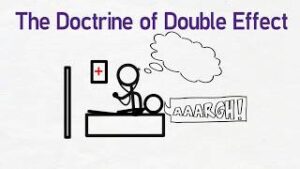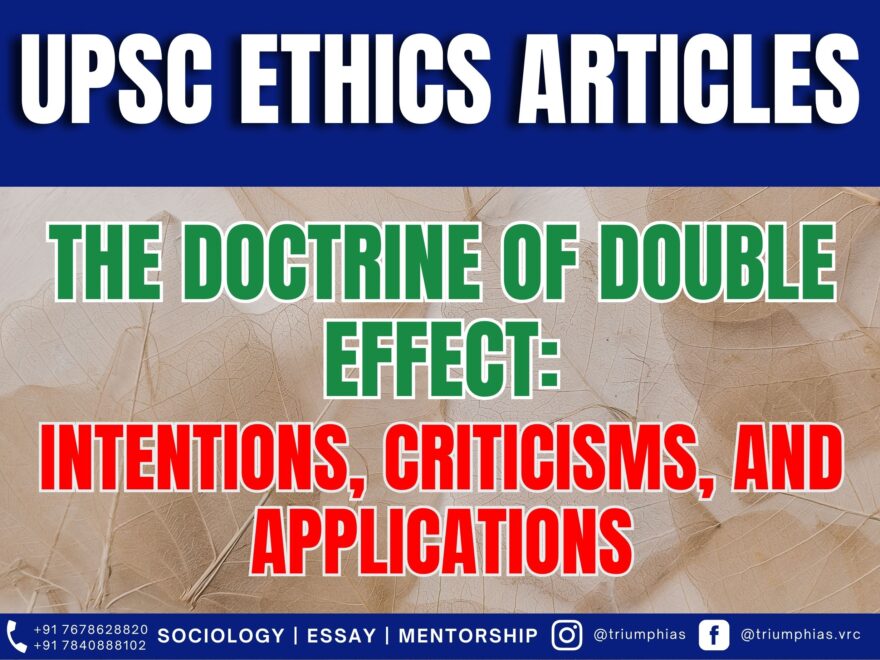Doctrine of Double Effect
(Relevant for Ethics, Integrity and Aptitude)

Doctrine of Double Effect
The abbreviation DDE pertains to the differentiation between deliberate intentions and anticipated consequences, and scrutinizes the ethical implications of this differentiation in the context of unfavorable results. It is often observed that numerous institutions and governmental bodies employ this theory as a rationale when evaluating the ethical and factual underpinnings of their operational methods and policy choices.
In most instances, the theory posits that the majority of individuals and their deeds are inherently benevolent, as their actions are propelled by the intention to yield positive results.
The origin of the doctrine of double effect can be traced back to the teachings of St. Thomas Aquinas. He contends that the act of killing one’s aggressor is justifiable as long as the intent is not to cause death.
The doctrine of double effect underscores that the foundation of morality rests upon the initial intent of an action. Regardless of whether an adverse consequence was unanticipated, this theory maintains that the initial action is ethically justified due to its intention to engender a positive outcome.
The doctrine of double effect asserts that it is impermissible to achieve a positive outcome through means that are inherently negative, but it does not prohibit achieving a positive outcome through means that might also yield negative consequences.
Criticisms of the Doctrine of Double Effect
- The rule of law stipulates that individuals bear accountability for their actions, rendering the original intent inconsequential.
- John Stuart Mill dismisses the notion that two actions yielding identical consequences or ultimate outcomes can possess differing ethical implications. Mill contends that ethical evaluation should not encompass the initial intent, consequently rejecting the concept.
- Consequently, it becomes imperative to differentiate between means that are intrinsically negative and means that may lead to both positive and negative outcomes.
Examples/ Applications:
Terror Bombing vs. Tactical Bombing: The terror bomber’s objective is to induce civilian casualties with the intention of eroding the enemy’s determination. When these bombs lead to civilian deaths, this outcome aligns with the bomber’s intent. Conversely, the tactical bomber targets military installations while acknowledging that such actions could result in civilian casualties. In cases where civilians are killed by their bombs, this is a foreseeable yet unintended consequence. Even if both types of bombers are equally certain to cause the same number of civilian deaths, terror bombing is considered impermissible, whereas tactical bombing is regarded as allowable.
Illustration of Abortion by a Physician: A medical practitioner, despite opposing abortion even for the sake of preserving the mother’s life, might consistently maintain that performing a hysterectomy on a pregnant woman with cancer is justifiable. In performing the hysterectomy, the doctor’s aim is to save the woman’s life while foreseeing the fetus’s demise. Conversely, carrying out an abortion entails intending to terminate the fetus to secure the mother’s well-being.
Sample Question for UPSC Sociology Optional Paper:
Q 1: “How does the Doctrine of Double Effect influence decision-making in governmental policies?”
Answer:
The Doctrine of Double Effect offers a framework for evaluating the ethical implications of policy decisions, emphasizing the importance of intention over unforeseen consequences.
Q 2: “Do you agree with John Stuart Mill’s criticism of the Doctrine of Double Effect? Why or why not?”
Answer:
Mill’s focus on outcomes over intentions challenges the core premise of DDE, provoking debate on whether ethical evaluation should include the original intent or solely the consequences.
Q 3: “How does the Doctrine of Double Effect relate to medical ethics, particularly in scenarios like abortion or end-of-life decisions?”
Answer:
In medical ethics, DDE can justify actions like hysterectomy in pregnant cancer patients by focusing on the intent to save the mother’s life, even if it results in the death of the fetus.
Q 4: “What are the sociological implications of utilizing the Doctrine of Double Effect in legal systems?”
Answer:
Incorporating DDE into legal systems could lead to nuanced judgements that consider the moral intentions behind actions, but it may also complicate accountability measures.
Related Blogs …
|
|
To master these intricacies and fare well in the Sociology Optional Syllabus, aspiring sociologists might benefit from guidance by the Best Sociology Optional Teacher and participation in the Best Sociology Optional Coaching. These avenues provide comprehensive assistance, ensuring a solid understanding of sociology’s diverse methodologies and techniques.
Best Sociology Optional Teacher, Best Sociology Optional Coaching, Sociology Optional Syllabus, Ethics, Doctrine of Double Effect, DDE, St. Thomas Aquinas, John Stuart Mill, intentionality, terror bombing, tactical bombing, abortion, ethical theory, morality, consequences, moral philosophy
Choose The Best Sociology Optional Teacher for IAS Preparation?
At the beginning of the journey for Civil Services Examination preparation, many students face a pivotal decision – selecting their optional subject. Questions such as “which optional subject is the best?” and “which optional subject is the most scoring?” frequently come to mind. Choosing the right optional subject, like choosing the best sociology optional teacher, is a subjective yet vital step that requires a thoughtful decision based on facts. A misstep in this crucial decision can indeed prove disastrous.
Ever since the exam pattern was revamped in 2013, the UPSC has eliminated the need for a second optional subject. Now, candidates have to choose only one optional subject for the UPSC Mains, which has two papers of 250 marks each. One of the compelling choices for many has been the sociology optional. However, it’s strongly advised to decide on your optional subject for mains well ahead of time to get sufficient time to complete the syllabus. After all, most students score similarly in General Studies Papers; it’s the score in the optional subject & essay that contributes significantly to the final selection.
“A sound strategy does not rely solely on the popular
Opinion of toppers or famous YouTubers cum teachers.”
It requires understanding one’s ability, interest, and the relevance of the subject, not just for the exam but also for life in general. Hence, when selecting the best sociology teacher, one must consider the usefulness of sociology optional coaching in General Studies, Essay, and Personality Test.
The choice of the optional subject should be based on objective criteria, such as the nature, scope, and size of the syllabus, uniformity and stability in the question pattern, relevance of the syllabic content in daily life in society, and the availability of study material and guidance. For example, choosing the best sociology optional coaching can ensure access to top-quality study materials and experienced teachers. Always remember, the approach of the UPSC optional subject differs from your academic studies of subjects. Therefore, before settling for sociology optional, you need to analyze the syllabus, previous years’ pattern, subject requirements (be it ideal, visionary, numerical, conceptual theoretical), and your comfort level with the subject.
This decision marks a critical point in your UPSC – CSE journey, potentially determining your success in a career in IAS/Civil Services. Therefore, it’s crucial to choose wisely, whether it’s the optional subject or the best sociology optional teacher. Always base your decision on accurate facts, and never let your emotional biases guide your choices. After all, the search for the best sociology optional coaching is about finding the perfect fit for your unique academic needs and aspirations.
To master these intricacies and fare well in the Sociology Optional Syllabus, aspiring sociologists might benefit from guidance by the Best Sociology Optional Teacher and participation in the Best Sociology Optional Coaching. These avenues provide comprehensive assistance, ensuring a solid understanding of sociology’s diverse methodologies and techniques. Sociology, Social theory, Best Sociology Optional Teacher, Best Sociology Optional Coaching, Sociology Optional Syllabus.
Best Sociology Optional Teacher, Sociology Syllabus, Sociology Optional, Sociology Optional Coaching, Best Sociology Optional Coaching, Best Sociology Teacher, Sociology Course, Sociology Teacher, Sociology Foundation, Sociology Foundation Course, Sociology Optional UPSC, Sociology for IAS,
Follow us :
🔎 https://www.instagram.com/triumphias
🔎https://www.youtube.com/c/TriumphIAS
https://t.me/VikashRanjanSociology
Find More Blogs
|
Scope of the subject and comparison with other social sciences |
|||
|
|
|
|
Modernity and social changes in Europe |

